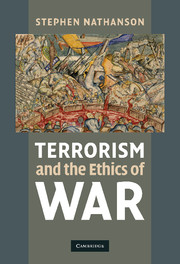Book contents
- Frontmatter
- Contents
- Acknowledgments
- Introduction
- PART I TERRORISM: WHAT'S IN A NAME?
- PART II WHY MORAL CONDEMNATIONS OF TERRORISM LACK CREDIBILITY
- PART III DEFENDING NONCOMBATANT IMMUNITY
- PART IV HOW MUCH IMMUNITY SHOULD NONCOMBATANTS HAVE?
- Conclusion: terrorism and the ethics of war
- Bibliography
- Index
Conclusion: terrorism and the ethics of war
Published online by Cambridge University Press: 05 June 2012
- Frontmatter
- Contents
- Acknowledgments
- Introduction
- PART I TERRORISM: WHAT'S IN A NAME?
- PART II WHY MORAL CONDEMNATIONS OF TERRORISM LACK CREDIBILITY
- PART III DEFENDING NONCOMBATANT IMMUNITY
- PART IV HOW MUCH IMMUNITY SHOULD NONCOMBATANTS HAVE?
- Conclusion: terrorism and the ethics of war
- Bibliography
- Index
Summary
In writing this book, I have focused on a centrally important but relatively narrow issue: the status of civilians in circumstances of war and political violence. Examining this issue, however, has led in many directions and raised many broader issues. In this concluding chapter, I want to return to the five questions I began with and then discuss how they generated new questions that changed the focus of the book. In addition, since utilitarian arguments have played a central role in my defense of noncombatant immunity and since this use of utilitarian ideas conflicts with many widely held views, I want to return to the question of whether utilitarian reasoning can support noncombatant immunity.
FIVE QUESTIONS, FIVE ANSWERS
What exactly is terrorism? Terrorism is a form of political violence, a tactic that can be used both by non-governmental groups and by governments. Terrorist attacks intentionally kill and injure innocent people (or credibly threaten to do so) in order to promote a political agenda. By attacking some limited number of innocent people, they try to influence a broader population or the decision-makers for that group.
If terrorism is in some way especially wrong, what features of terrorism make it especially wrong? Terrorism is especially wrong because it intentionally injures and kills civilians and thus violates the norm of noncombatant immunity. Terrorism rejects this fundamental constraint on political violence.
If terrorism is obviously wrong, as many people think, why do moral condemnations of terrorism often lack credibility?
- Type
- Chapter
- Information
- Terrorism and the Ethics of War , pp. 288 - 302Publisher: Cambridge University PressPrint publication year: 2010



